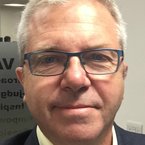
Narong Jongsirikul - Fotolia
CIO interview: David Ivell, chief technology officer, Good Energy
Renewable energy supplier aims to pioneer change in the sector through innovation, having refocused the organisation with technology as a “driving force”
Renewable energy supplier Good Energy is making a series of technology investments and betting on innovation to drive a shift in the UK’s business and home power consumption patterns.
Earlier this year, Good Energy announced the creation of a platform to accelerate innovation and bring new products and services to market, as well as hiring former CIO at The Prince’s Trust, David Ivell, as chief technology officer (CTO) to lead its new digital strategy as well as investments in new technologies and products.
Ivell says he was attracted to the role because he sees Good Energy as “the nemesis of those organisations polluting our planet”, but also because of the firm’s customer focus and the opportunities it offers to use technology and innovation to pioneer change.
“Clean energy now accounts for more than half of all new energy supply,” the executive told Computer Weekly. “The cost of solar energy generation has decreased to as low as one-sixth of the cost it was in 2005, meaning renewable energy will now start to be adopted by business, factories and millions of homes.
“Good Energy is accelerating rapidly – both in its growth ambitions and its innovation capabilities. My role as CTO is to create a customer-centric organisation utilising technology to fuel that acceleration and ensure our service is the best in the industry.”
Ivell says that as energy demand dynamics develop and the need for low carbon energy increases, a huge transformation is under way. This means equally significant investments are required across all energy technologies, as well as electricity grids and distribution systems, to keep up with those demands.
“Every family home will become a micro clean energy power station earning money while we go to work – in essence, we will be both energy consumers as well as energy producers,” he says. “There is a lot of discussion that we are on the cusp of the next industrial revolution – and providing clean energy from nature will be driving that.”

“Every family home will become a micro clean energy power station earning money while we go to work”
David Ivell, Good Energy
According to Ivell, the drivers of innovation over the past decade – such as social media, mobile, analytics and cloud – are now being augmented by robotics, machine learning and the internet of things (IoT), with renewable energy providing the power behind that.
Infrastructure in UK towns and villages has not changed significantly over the past hundred years, almost since trains arrived in their midst, says the CTO. That is because the drivers of innovation that he alludes to are “mostly invisible to people as they move around their daily life”.
Ivell says: “Fast forward five or 10 years and the world will look different – electric cars, possibly some driverless cars will be driving around on solar road surfaces. Some goods will be delivered by drone, shops may be 3D printing some goods, and our homes will be working hard to earn us money while we are at work, generating power.
“Innovation in renewable energy will be behind those developments. This sector will be at the heart of this industrial revolution and I want to be a part of that.”
Current and future IT priorities
Good Energy has a busy technology and innovation agenda in the coming months. The company has just gone through a transformation to refocus the organisation, with technology now being a “driving force underpinning growth”, says Ivell.
When it comes to key pillars of its overall IT strategy, Good Energy is moving towards a cloud-first model. But that doesn’t mean cloud only, but a hybrid model, using cloud where appropriate, says Ivell.
The firm is also working on projects geared towards the efficient acquisition and conversion of new customers, as well as delivering better customer experience and service, he says. In practice, this includes developments in web and mobile, along with the introduction of new Salesforce customer relationship management (CRM) tools and a unified communications strategy based around a Microsoft stack.
Integration will be key to Good Energy’s future, says Ivell. To that end, the company is working to create an enterprise integration platform that will enable it to integrate on-premise, but also to integrate platform-as-a-service (PaaS) and software-as-a-service (SaaS) cloud applications, as well as regulator, utility and trading partner apps and other third-party, cloud-based applications.
The company is also putting a sharp focus on data, with enhanced data warehousing and a move towards Power BI.
Read more CIO interviews
- PayPoint CIO Jon Marchant describes the company’s shift to retail services and how it went from knowing very little about electronic point of sale system software to creating its own.
- The CIO of logistics firm Wincanton, Richard Gifford, is in the process of improving its digital propositions and developing a digital supply chain, while dealing with legacy systems.
- Dentsu Aegis’s European CIO, Gideon Kay, talks about how to transform the organisation into a “digital economy business”, dealing with M&A activity and creating a centralised approach.
Commenting on Good Energy’s IT sourcing strategy, Ivell says the plan is being defined by the amount of valuable intellectual property that the firm is creating now, which is prompting a move towards insourcing around data and software products.
“We are creating a smaller number of strategic alliances and relationships,” he says.
The organisation is also implementing its Rapid Innovation framework to enable fast prototyping of new products and services, which then go on to customer testing.
“We are taking Rapid Innovation seriously to build new services and products at the cutting edge of this industry and are recruiting to expand that differentiator in the market,” says Ivell.
But such changes do not come without challenges. “Speed of delivery has moved from months to days and the cultural change is something that takes a while to embed,” he adds.
Good Energy’s idea is to encourage people to shift their energy use away from periods of high demand, and smart meters will be key to achieving that goal. The company will deploy the new generation of smart meters, called SMETS2, which will usher that cultural shift while allowing customers greater insight and control over their energy use.
“At the moment, power stations slavishly generate to meet any level of demand,” says Ivell. “But smart meters will enable a more flexible, intelligent relationship between generation and demand, which will reduce the need for infrastructure upgrades and allow a greater share of the UK’s power to come from variable, renewable sources of power, such as wind and solar.
“Smart meters are the key to increasing the UK’s renewable electricity capacity from 25% towards 100%, helping us to tackle climate change and reducing our dependence on imported fossil and nuclear fuels.”
Some businesses are already happy to be financially rewarded for switching off certain non-critical activities temporarily at peak periods, says Ivell. He argues that the deployment of smart meters and the development of smart household appliances could also see this demand-side response technology found in businesses also becoming common in homes.
“For instance, householders might agree to let their energy supplier automatically pause their dishwashers, fridges or tumble dryers for short periods in return for a payment or discount on their bills,” he says.
Building a digital workforce
IT professionals and people involved with digital initiatives represent a quarter of Good Energy’s overall headcount. Ivell says this function has grown by 30% this year, reflecting the company’s insourcing and internal development focus, and the intention is to hire more.
According to Ivell, the idea is to develop expertise and intellectual property around the firm’s enterprise integration and API (application programming interface) layer, as well as business intelligence and digital. However, the CTO concedes that hiring the talent Good Energy needs can also be a challenge, given the current dynamics of the UK jobs market.
“Some of the best talent within the 20-30 age bracket isn’t as mobile as in previous generations,” he says. “That can be due to characteristics of that age group or just the practical cost of living, which means young people are having difficulty moving away from their parents’ homes in the current property market.”
Despite the intricacies around attracting talent, Ivell is upbeat about growing his department.
“We truly believe we are building one of the top digital teams in the UK and are starting to attract extraordinary talent while we accelerate,” he says. “Successful recruitment will therefore be of paramount importance.”










